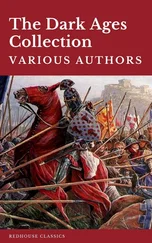It is important to remember that the position of Romulus was not constitutional inasmuch as he had not been recognised by the Emperor at Constantinople, in whose eyes Nepos was still the Augustus of the West. For twelve months Orestes ruled Italy in the name of his son. His fall was brought about by a mutiny of the troops. The army, which the Master of Soldiers commanded, seems to have consisted under Ricimer and his successors almost exclusively of East Germans, chiefly Heruls, also Rugians and Scirians. According to the usual custom, 73they were quartered on the Italians. But they were weary of this life. They desired to have roof-trees and lands of their own, and they petitioned Orestes to reward them for their services, by granting them lands and settling them permanently in Italy on the same principle on which various German peoples had been settled in other provinces. They did not demand the exceptionally large concession of two-thirds of the soil which had been granted by Honorius to the Visigoths; they asked for the only grant of one-third which had been assigned, for instance, to the Burgundians. But such a settlement in Italy was a very different thing from settlement in Gaul or Spain, and Orestes, notwithstanding his long association with Germans and Huns, was sufficiently Roman to be determined to keep the soil of Italy inviolate. He rejected the demand. The discontented soldiers found a leader in the Scirian Odovacar, one of the chief officers of Orestes. 74Ticinum to which Orestes retired was easily taken, and the Patrician was slain at Placentia (August 28, A.D. 476). “Entering Ravenna, Odovacar deposed Augustulus but granted him his life, pitying his infancy and because he was comely, and he gave him an income of six thousand solidi and sent him to live in Campania with his relatives.” 75
The soldiers had proclaimed Odovacar king. 76But it was not as king over a mixed host of various German nationalities that Odovacar thought he could maintain his position in Italy. The movement which had raised him had no national significance, and if he retained the royal title of an East German potentate, it was as a successor of Ricimer, Gundobar, and Orestes that he hoped to govern the Italians. In other words, he had no idea of detaching Italy from the Empire, as Africa and much of Gaul and Spain had come to be detached. The legal position was to continue as before. 77But the system of Ricimer was to be abandoned. There were be no more puppet Emperors in the West; Italy was to be under the sovranty of the Emperor at Constantinople, and its actual government was to be in the hands of Odovacar, who as Master of Soldiers was to be a minister of the Emperor, while he happened at the same time to be king of the East Germans who formed the army.
With this purpose in view Odovacar made the deposition of Romulus take the form of an abdication, and induced the Roman Senate to endorse formally the permanent institution of a state of things which had repeatedly existed in the days of Ricimer. A deputation of senators, in the name of Romulus, was sent to the Augustus at Constantinople to announce the new order of things. Zeno had already recovered the throne, from which Basiliscus had driven him, when the ambassadors arrived and informed him that they no longer needed a separate Emperor but that his sole supremacy would be sufficient; that they had selected Odovacar as a man capable of protecting Italy, being both a tried soldier and endowed with political intelligence. They asked Zeno to confer upon him the rank of Patrician and entrust him with the administration of Italy. They bore with them the Imperial insignia which Romulus had worn (A.D. 477). 78
At the same time messengers arrived from Nepos to congratulate Zeno on his restoration, to ask for his sympathy with one who had suffered the same misfortune as he, and to crave his aid in men and money to recover the throne. But for the existence of Nepos, the situation would have been simple. Zeno could not ignore his legal right, but was not prepared to support it with an army. He told the representatives of the Senate that of the two Emperors they had received from the East, they had slain Anthemius and banished Nepos; let them now take Nepos back. But he granted the other request. He sent to Odovacar a diploma conferring the Patriciate, and wrote to him, praising the respect for Rome and the observance of order which had marked his conduct, and bidding him crown his goodness by acknowledging the exiled Emperor. The fact that Verina was the aunt of the wife of Nepos was a consideration which helped to hinder Zeno from disowning him. Odovacar did not acknowledge the claim of Nepos, and Zeno cannot have expected that he would.
The events of A.D. 476 have been habitually designated as the “Fall of the Western Empire.” The phrase is inaccurate and unfortunate, and sets the changes which befell in a false light. No Empire fell in A.D. 476; there was no “West Empire” to fall. There was only one Roman Empire, which sometimes was governed by two or more Augusti. If it is replied that expression is merely a convenient one to signify what contemporary writers sometimes called the Hesperian realm ( Hesperium regnum ), the provinces which had been, since the death of Theodosius I, generally under the separate government of an Emperor residing in Italy, and that all that is meant is the termination of this line of western Emperors, it may be pointed out that A.D. 480 is in that case the significant date. For Julius Nepos, who died in that year, was the last legitimate Emperor in the West; Romulus Augustulus was only a usurper. The important point to seize is that, from the constitutional point of view, Odovacar was the successor of Ricimer, and that the situation created by the events of A.D. 476 was in this respect similar to the situation in the intervals between the reigns of the Emperors set up by Ricimer. If, on the death of Honorius, there had been no Valentinian to succeed him, and if Theodosius II had exercised the sovranty over the western provinces, and if no second Augustus had been created again before the western provinces had passed under the sway of Teutonic rulers, no one would have spoken of the “Fall of the Western Empire.” Yet this hypothetical case would be formally the same as the actual event of A.D. 476 or rather of A.D. 480. The West came finally, as it had more than once temporarily, under the sole sovranty of the Emperor reigning at East Rome.
The Italian revolution of A.D. 476 was, however, a most memorable event, though it has been wrongly described. It stands out prominently as an important stage in the process of the dismemberment of the Empire. It belongs to the same catalogue of chronological dates which includes A.D. 418, when Honorius settled the Goths in Aquitaine, and A.D. 435, when Valentinian ceded African lands to the Vandals. In A.D. 476 the same principle of disintegration was first applied to Italy. The settlement of Odovacar’s East Germans, with Zeno’s acquiescence, began the process by which Italian soil was to pass into the hands of Ostrogoths and Lombards, Franks and Normans. And Odovacar’s title of king emphasised the significance of the change.
It is highly important to observe that Odovacar established his political power with the co-operation of the Roman Senate, and this body seems to have given him their loyal support throughout his reign, so far as our meagre sources permit us to draw inferences. At this time the senators who counted politically belonged to a few old and distinguished clans, possessing large estates and great wealth, particularly the Decii and the Anicii. 79The leading men of these families received high honours and posts under Odovacar. Basilius, Decius, Venantius, and Manlius Boethius held the consulship and were either Prefects of Rome or Praetorian Prefects; 80Symmachus and Sividius were consuls and Prefects of Rome; 81another senator of old family, Cassiodorus, was appointed a minister of finance. 82The evidence indicates that while it was Odovacar’s policy to appoint only men of Roman families to the Prefecture of the City, he allowed the Prefect to hold office only for a year, so that no man might win a dangerous political importance. 83
Читать дальше












